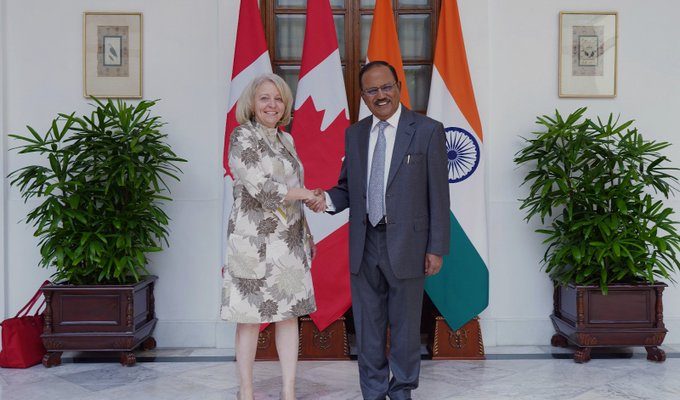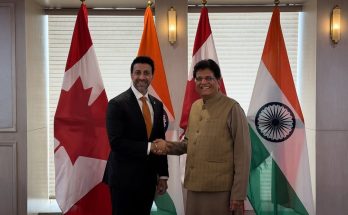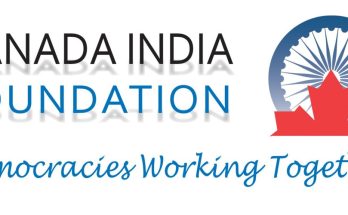#India# Canada# Ajit Doval# Nathalie G. Drouin# India Canada Security Ties
IBNS-CMEDIA: National Security Adviser Ajit Doval met his Canadian counterpart Nathalie G. Drouin, National Security and Intelligence Adviser of Canada, recently in New Delhi, when they tried to strengthen security cooperation and further reinforce existing mechanisms of engagement.
The Ministry of External Affairs said the meeting occurred on September 18 in New Delhi.
“The visit was a part of the regular bilateral security dialogue between the two sides,” read a statement issued by the Ministry of External Affairs.
It was also an opportunity to follow-up on the discussions between the Prime Minister Modi and Prime Minister Carney on the side-lines of the G7 Summit in Kananaskis, in Alberta, Canada.
During the meeting, both the sides acknowledged the clear momentum for rebuilding trust and expanding cooperation at the highest levels of political leadership.
“They had productive discussions on advancing the bilateral relationship including in areas such as counter terrorism, combating transnational organised crime and intelligence exchanges,” read a statement issued by the MEA.
They agreed to strengthen security cooperation and further reinforce existing mechanisms of engagement.
The two NSAs also deliberated on the priority areas for future cooperation and exchanged views on regional and global developments.
“The two sides agreed to work closely on the way forward and adopt a collaborative approach towards a new chapter in bilateral relations,” read a statement issued by the Ministry of External Affairs.
The meeting between the two officials marked an improvement in the strained relationship over the killing of Khalistani leader Hardeep Singh Nijjar.
Nijjar killing and fallout
The India-Canada relationship hit a low in 2023 when then-Prime Minister Justin Trudeau publicly alleged Indian involvement in the assassination of Hardeep Singh Nijjar, who had been declared a terrorist by India.
Nijjar was killed in British Columbia, prompting a diplomatic standoff.
India denied the allegation and accused Canada of allowing Sikh extremist groups to operate freely on its soil.
The CSIS report follows disclosures made in October by the Royal Canadian Mounted Police (RCMP), which stated that over a dozen threats had been shared with Sikh activists in Canada.
These individuals had been vocal in advocating for a separate Khalistan state in India.
Despite the claim, both India and China have ignored the report. Neither the Indian High Commission nor the Chinese Embassy in Canada have responded to the latest intelligence report.





